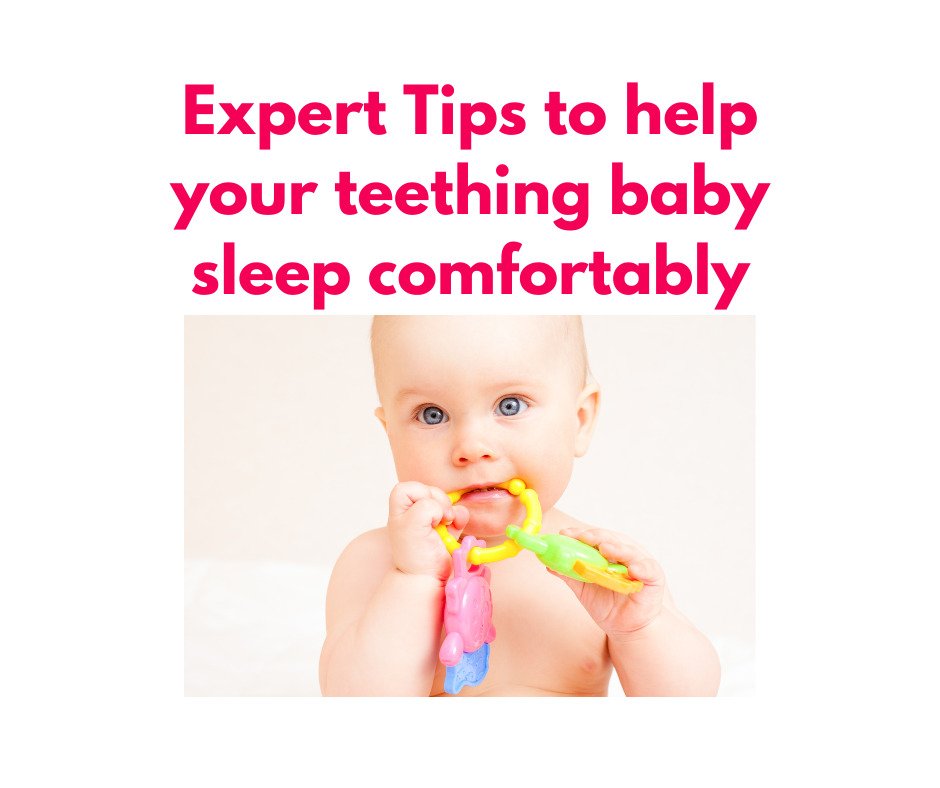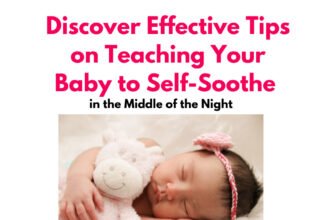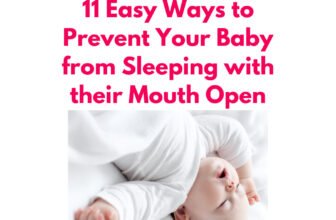
If you’re struggling with a teething baby who can’t seem to get a good night’s sleep, we have some helpful tips to ease the discomfort and promote better sleep. Our guide offers practical solutions and advice to soothe your little one and help them rest comfortably. Say goodbye to sleepless nights and hello to a happier, more rested baby.
Expert Tips to help your teething baby sleep comfortably
Teething can be a challenging time for both babies and parents, with disrupted sleep being a common issue. Fortunately, there are several tips and techniques you can use to help your little one rest comfortably during this time. Here are some sleep solutions for teething babies:
Offer comfort
Teething babies often crave extra comfort and attention. Try holding, rocking, or cuddling your baby to help them relax and feel secure. You can also use a swaddling blanket like this popular one to provide a snug and secure sleeping environment.

During the teething process, babies tend to feel fussy and uncomfortable, and providing extra comfort can make all the difference in helping them sleep better.
Also Read – Top Tips for Helping Your Gassy Baby Sleep Peacefully Through the Night
Use a teething aid
Teething toys, rings, and other aids can help soothe sore gums and distract your baby from the discomfort. Consider refrigerated teething toys like this bestseller here or a pacifier designed specifically for teething babies like this one.

Teething toys and aids can be a lifesaver during the teething process, as they help soothe sore gums and distract your baby from the discomfort.
Try natural remedies
Natural remedies can be a safe and effective way to help ease teething discomfort. Some parents swear by chamomile tea, which has natural anti-inflammatory and soothing properties. You can also try a gentle gum massage using your clean finger or a soft washcloth.

Another natural remedy to consider is a teething necklace like these ones, which is made from natural amber and can help reduce inflammation and pain in teething babies. Amber is believed to have natural anti-inflammatory properties that can help soothe sore gums.
Keep a consistent sleep routine
A consistent sleep routine can be beneficial for teething babies, as it helps them feel more secure and promotes better sleep. Stick to a regular bedtime and avoid overstimulating activities before bed, such as playing with toys or watching TV. Instead, create a calming sleep environment with soft lighting and a comfortable temperature.

You can also use a sound machine like this one to create a soothing sleep environment with white noise or lullabies.
Also Read – How can I help my baby sleep through the night?
Consider sleep aids:
Consider using sleep aids such as baby sleep sacks, sleep positioners, or sleep training methods. This bestselling sleepsack saddle is a popular sleep sack that can help your baby feel secure and comfortable while sleeping.

Sleep positioners like this popular one can also help support your baby’s head and neck during sleep.
Sleep training methods, such as the Ferber method or the Weissbluth method, can also be effective in helping your baby learn to self-soothe and sleep through the night. However, it’s important to consult with your pediatrician before attempting any sleep training methods.
Use a cool washcloth
Dampen a washcloth with cool water and gently rub it on your baby’s gums to help soothe teething pain. You can also place the washcloth in the refrigerator for a few minutes before using it to provide an extra cooling sensation.
Offer a bedtime snack
A small, healthy snack like a banana or a slice of avocado can help your baby feel full and sleepy before bedtime. Just make sure to avoid sugary snacks that can cause a spike in energy.
Adjust the room temperature
Teething can cause your baby to feel hot and sweaty, so make sure to keep the room temperature cool and comfortable. Use a fan or air conditioner to help regulate the temperature.
Give a warm bath
A warm bath before bedtime can help your baby feel relaxed and ready for sleep. You can also add a few drops of lavender oil to the bathwater to help promote relaxation.
Consider pain relief medication
If your baby is really struggling with teething pain and having trouble sleeping, talk to your pediatrician about over-the-counter pain relief medication like infant acetaminophen or ibuprofen. Just make sure to follow the dosage instructions carefully and only use as directed by your pediatrician.
Use white noise
White noise can help drown out other sounds that might wake up your baby during sleep. You can use a white noise machine, a fan, or a smartphone app that plays white noise.
Massage your baby’s gums
Gently massaging your baby’s gums can help soothe teething pain. You can use a clean finger or a teething massage tool, like the Nuby Soothing Teether.
Try acupressure
Some parents find that acupressure can help relieve teething pain. You can try gently applying pressure to specific points on your baby’s body, like the fleshy part between the thumb and forefinger.
Stay calm and patient
Teething can be a frustrating and challenging time for both you and your baby, but it’s important to stay calm and patient. Your baby can pick up on your emotions, so try to remain calm and positive during bedtime and throughout the day.
Take turns with your partner
If you have a partner or co-parent, take turns with them to handle nighttime wake-ups and feedings. This can help both of you get the rest you need to take care of your baby during the day.
Be flexible
Teething can disrupt your baby’s sleep routine, so it’s important to be flexible and adjust your expectations as needed. If your baby needs extra cuddles or feedings during the night, try to be patient and go with the flow.
Every baby is different and there is no one-size-fits-all solution to teething and sleep challenges. The most important thing is to stay attuned to your baby’s needs and do what works best for your family.
By using a combination of these tips and techniques, you can help your teething baby get the restful sleep they need during this challenging time. Remember to be patient and consistent in your approach, and always consult with your pediatrician before trying any new sleep solutions.
When do babies start teething?
Babies typically start teething between 4 and 7 months of age, but some babies can start as early as 3 months or as late as 12 months.
10 Proven Techniques to Soothe and Calm Your Colicky Baby for a Good Night’s Sleep
What are some signs that my baby is teething?
Some signs that your baby is teething include drooling, irritability, biting or chewing on objects, swollen or tender gums, and disrupted sleep.
How can I soothe my baby’s teething pain?
There are many ways to soothe teething pain, including using teething toys or rings, massaging your baby’s gums, using a cold washcloth or teething ring, or giving your baby a pain reliever like acetaminophen or ibuprofen (consult with your pediatrician before giving any medication).
How can I help my teething baby sleep through the night?
To help your teething baby sleep through the night, you can try offering a warm bath before bedtime, using a pacifier, using a teething necklace, using a white noise machine, or adjusting your baby’s sleep environment (e.g. making sure the room is dark and cool).
Is it safe to use teething gels or tablets?
Teething gels or tablets that contain benzocaine or lidocaine can be harmful to babies, so it’s best to avoid them. Natural remedies like chamomile tea or clove oil can be safer alternatives, but always consult with your pediatrician before trying any new remedies.
Can teething cause a fever?
Yes, teething can sometimes cause a low-grade fever, but a fever higher than 100.4°F (38°C) could indicate an infection and requires medical attention.
Should I give my teething baby pain relievers every night?
No, it’s not recommended to give your baby pain relievers every night. Pain relievers like acetaminophen and ibuprofen should be used sparingly and only when necessary, as overuse can lead to side effects or health complications.
Can teething cause diarrhea?
Teething can sometimes cause a change in your baby’s bowel movements, but it’s not typically a direct cause of diarrhea. If your baby has diarrhea, it could be a sign of an infection and requires medical attention.
What are some teething toys that can help my baby?
Some popular teething toys include Sophie the Giraffe, the Nuby Teething Necklace, the Munchkin Twisty Figure 8 Teether, and the Baby Banana Infant Toothbrush. These toys are available on both Amazon.in and Amazon.com.
Should I let my baby chew on a frozen teething ring?
No, it’s not recommended to let your baby chew on a frozen teething ring, as it can be too hard and cause damage to your baby’s gums. Instead, chill the teething ring in the fridge or offer a wet washcloth that has been chilled in the fridge.
Can teething cause ear infections?
Teething itself doesn’t cause ear infections, but the increased drooling and fluid buildup in the ear from teething can increase the risk of an ear infection.
Is it normal for my baby to wake up more frequently during teething?
Yes, it’s normal for babies to wake up more frequently during teething due to the discomfort and pain associated with teething.
Can teething affect my baby’s eating habits?
Yes, teething can sometimes affect your baby’s eating habits, as they may be too uncomfortable to eat or drink normally. Offer softer foods or a cold drink to help soothe their gums.
How long does teething last?
Teething can last for several months, as different teeth can come in at different times. Most babies will have all of their primary teeth by the age of 3.
Are there any natural remedies that can help my baby with teething pain?
Yes, there are several natural remedies that can help soothe teething pain, including chamomile tea, clove oil, and cold or frozen fruits or vegetables. Always consult with your pediatrician before trying any new remedies.
Teething can be a difficult time for both babies and parents, but with the right tips and tools, you can help your little one get through it comfortably. From using teething toys and cold compresses to implementing a consistent bedtime routine and staying patient, there are many ways to support your teething baby’s sleep and overall well-being.

With the help of products like the Nuby Teething Necklace, the Munchkin Twisty Figure 8 Teether, and the Baby Banana Infant Toothbrush, available on both Amazon.in and Amazon.com, you can provide your little one with safe and effective relief from teething pain.
Remember to trust your instincts and consult with your pediatrician if you have any concerns. With a little extra care and attention, you can help your teething baby get the restful sleep they need to grow and thrive.







